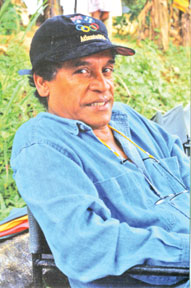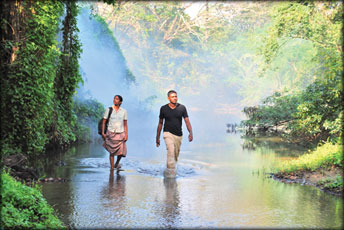|
Fiction and film-making:
Intricacies of turning a fiction into a movie
Interviewed by Ranga CHANDRARATHNE
In a wide ranging interview filmmaker Chandran Rutnam explains the
intricacies involved in turning fiction into film. Citing his latest
film 'Alimankada' (The Road from Elephant Pass) which was based on the
Gratiaen Award winning novel by Nihal de Silva, the filmmaker spells out
constraints encountered in such an exercise and how he had been faithful
to the Nihal de Silva's original work. However, the ending of the film
has been altered to render it a healing effect in the aftermath of the
bitterly-fought civil war.
 |
|
Filmmaker Chandran
Rutnam |
Excerpts of the interview:
Q: We want to discuss with you today a few issues focusing on making
films out of literary products, mainly fictions covering both your
recent film Alimankada (The Road from Elephant Pass) based on Nihal De
Silva's Gratiaen Award winning novel. It is a classic example depicting
the challenges faced by many and reputed film directors who had produced
films based on literary artifacts by converting both complex and simple
texts into visual media. First, I want to ask you about the challenges
of film directors in understanding textual interpretations into another
medium. Would you please comment?
A: When adapting a literary work into a motion picture, one cannot
have any set rules. It depends on the particular work in question. When
it was written, whether it was considered a classic and also its
popularity. All these or, some of these elements must be considered.
A film-maker could take a classic and devise a story based on the
classic. There would be a 'certain obligation' or a 'loyalty' to the
narrative. For instance, I do not think you should distract a classic to
a high degree and then announce that it was based on the classic.
One might take a gem of an idea from a well read story and not give
any credit to the original.
I personally feel that one should stay with the substance as much as
one possibly could but, could make some deviation to fulfill cinematic
expression which creates cinematic continuity, pace and flow.
In the case of 'The Road from Elephant Pass', I remained as loyal to
the novel as possible, appreciating the author's balanced narrative.
However, the author spent relatively long chapters on the natural beauty
of nature and several sequences of bird and animal life. I obviously had
to cut it short but also wanted to leave the symbolic ideals and
appreciation of both charactersí attitudes towards nature intact. I must
say that I had to change the ending and have received criticisms and
kudos for the scene.
However, as a cinematic work I feel I did the right thing although
you may disagree.
Q: How much freedom, a film director has when he produces a film
using a piece of fiction?
A: How popular is the fiction? Is it current? Do we dare make
changes? To what extent? Most of the time film-maker's will endeavour to
make some changes to enhance the flow of the visuals. The decision and
the freedom to make alterations and/or changes is within the director's
vision and his integrity in relation to the work of fiction he is
dealing with.
Q: One of the controversial novels that were ever filmed, was making
an epic film out of Boris Pasternak's classic; Doctor Zhivago. David
Lean changed the focus of the novel by narrating his film through the
eyes of Yuri Zhivago's brother. The film's narrative tale involves Cheka
General Yevgraf Zhivago (Alec Guinness) searching for the child of his
half brother, poet and doctor, Yuri Zhivago from his other woman;
mistress Larissa (Lara) Antipova (Julie Christie).
Is this a good technique because director, David Lynn had used his
artistic independence in telling the same tale of the novel through a
different protagonist?
What is your comment on the film directors' artistic independence in
order to make a textual tale into a visual medium?
A: David Lean takes a minimum of two years to create a script. He
actually works with a screen writer almost daily extracting ideas. In
the case of "Doctor Zhivago", his screen writer was none other than
Robert Bolt, whom he had collaborated with on the classic film 'Lawrence
of Arabia'. Together, they decided to narrate the story through Doctor
Zhivago's brother. Sometimes when reading a novel, one could follow the
sequence of events with detailed descriptives and hold the attention of
the reader.
However, when it comes to a visual presentation, the screen play and
film-maker may have to create other devices to hold the attention of the
audience.
Therefore, it is not unusual for the director to proceed on a
different path to accomplish the visual narrative in cinema. Of course,
"Doctor Zhivago" was a classic example of a very successful
accomplishment.
Q: Unlike David Lean, I find you have been very faithful to Nihal De
Silva's novel when you made a film out of it. Was there any special
reason to be very faithful to the original text in your case?
A: In the case of my screenplay which was adapted from Nihal de
Silva's 'The Road from Elephant Pass', it was the narrative that
appealed to me and while reading I visualized it as a motion picture and
tried very hard to be 'as close to the novel as possible'. I had to
consolidate many scenes and omit repetitious sequences that may have
bogged the flow of the movie.
Q: In the novel, 'The Road from Elephant Pass', the author considers
human relationships that transcend synthetic barriers of ethnicity,
class, and creed and you have use the same values as the core of the
film. Is this because you want to recreate the novel instead of
reinterpreting it?
 |
|
A scene from the
film Alimankada (Road from Elephant Pass) |
A: I had no intention of re-interpreting the novel. The story stands
up well and conveyed the authors view of the different sides to the
issues and also the perplexity of those issues in a fair and even
manner, at the same time demonstrating the important human element of
respect for each other. It is evident in the novel and in the movie.
Q: Going back to another Sri Lankan film connection in the
international arena, when Anthony Minghella made the Hollywood movie,
English Patient out of Michael Ondaatje's Booker Prize winning novel, he
changed the novel and removed a quite a few characters. The film,
directed by Anthony Minghella, and won nine Academy Awards including
Best picture. It is well-known that Ondaatje worked closely with the
film-maker. As in your case, did you find it difficult not to have the
author of the book to discuss when you produced Alimankada?
A: When writing for the screen, the writer is forced to remove
certain characters or incidents that are not important to the flow of
the narrative. At the same time a writer may create a single character
who represent several elements that are vital to the story, or, in some
cases to do away with an entire segment and follow the main story line
with some selected sub texts.
I had the good fortune of having the counsel of the author at the
start if my writing and was able to agree on the general outline of the
screen play, which gave me great satisfaction. A month into my writing
we lost the author and dear friend, Nihal to an improvised explosive
device in Wilpattu.
Q: I found your film script to be one of the most imposing and
confrontational scripts which stands out as a true rendering of subtle
human relationships. How did you manage and later incorporate most of
the details of the novel into the script?
A: I decided that I will not dilute the potent and important dialogue
created by the author, which I felt fitted well into the story of the
two protagonists. The sharp exchanges and the subtle development of the
relationship is the core of the movie.
Q: To what extent, a film script should be innovative or original,
when it is based on a piece of fiction?
A: As I mentioned before, it depends on many issues. It is entirely
the choice of the creator's of the film. And it is their decision as to
which way they wish to go.
In my opinion, the right innovation, could enhance the story.
Innovate, delete, change, but don't bore the audience!
Q: Although the narrative tale of your film is interspersed with
bizarre scenes that provide spice to the story, the crust of the
narrative was infused with humanity as an offering for a war weary
nation and to provide a refreshing postwar vision for a healing nation.
Do you think that you have achieved your objective?
A: My objective was not to create a postwar story of healing. It is
the humanity, tolerance and respect within the novel that attracted me.
It is our good fortune that the film was released at this particular
time, at the end of the war and that the audience views it in the light
of healing and reconciliation.
Q: Some of the gifted young film-makers such as, Asoka Handagama,
Prasanna Vithanage and Vimukthi Jayasundara have also focused on our
past thirty years of the civil war in their films. Do you think that
there would be more films of our civil war to come both for humanitarian
and commercial reasons?
A: I am sorry to say that I have not seen any of the films that
focused on our civil war. But I am sure many films will be made about it
in the future.
Q: What is your next project going to be?
A: I am working on a couple of screen plays which I hope to film this
year. One of which will be a collaboration with my Indian partners which
I will direct.
|

